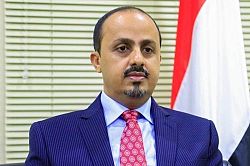
Eryani: Abduction of Political Leader a Stark Warning to Those Who Still Believe in Coexistence with Houthis
Minister of Information, Culture, and Tourism, Muammer al-Eryani, strongly condemned the Houthi militia's continued abduction of General Secretary of the Sana'a General People's Congress, Ghazi al-Ahwal, and several associates.

BULGARIA: UN Tourism Global Conference on Wine Tourism
Excellent wine practices and global trends in wine tourism will be among the topics on the second day of the 9th UN Tourism Global Conference on Wine Tourism in Plovdiv.

Gold surpasses $3,900 per ounce for first time
The price of gold jumped over the $3,900 per ounce mark for the first time today, Monday, driven by increased demand for safe-haven assets amid a U.S. government shutdown.

Paris Saint-Germain beat Barcelona 2-1 in the Champions League
Paris Saint-Germain beat Barcelona 2-1 in the second round of the Champions League for the league stage.
Last Update: ،
2025/10/09
Time
04:39:28
Latest News:
 Eryani: Abduction of Political Leader a Stark Warning to Those Who Still Believe in Coexistence with ..
Eryani: Abduction of Political Leader a Stark Warning to Those Who Still Believe in Coexistence with ..
 Vice Foreign Minister Discusses Enhanced Partnership and Migration Issues with UN High Commissioner
Vice Foreign Minister Discusses Enhanced Partnership and Migration Issues with UN High Commissioner
 Al-Hadrami presents his credentials to Czech President as Ambassador to Yemen
Al-Hadrami presents his credentials to Czech President as Ambassador to Yemen
 Yemen Participates in Expert Group Meeting on Strengthening Civil Registration in Cairo
Yemen Participates in Expert Group Meeting on Strengthening Civil Registration in Cairo
 Interior Minister Discusses Enhanced Security Cooperation with US Ambassador
Interior Minister Discusses Enhanced Security Cooperation with US Ambassador
Latest News:
 Eryani: Abduction of Political Leader a Stark Warning to Those Who Still Believe in Coexistence with ..
Eryani: Abduction of Political Leader a Stark Warning to Those Who Still Believe in Coexistence with ..
 Vice Foreign Minister Discusses Enhanced Partnership and Migration Issues with UN High Commissioner
Vice Foreign Minister Discusses Enhanced Partnership and Migration Issues with UN High Commissioner
 Al-Hadrami presents his credentials to Czech President as Ambassador to Yemen
Al-Hadrami presents his credentials to Czech President as Ambassador to Yemen
 Yemen Participates in Expert Group Meeting on Strengthening Civil Registration in Cairo
Yemen Participates in Expert Group Meeting on Strengthening Civil Registration in Cairo
 Interior Minister Discusses Enhanced Security Cooperation with US Ambassador
Interior Minister Discusses Enhanced Security Cooperation with US Ambassador
Houthi-Saleh coup caused deterioration of situation in Yemen, official affirms
[22/08/2017 03:15]
NEWYORK-SABA
Yemen Local Administration Minister has affirmed that the situation in Yemen deteriorated due to the military coup carried out by the Houthi-Saleh militias against the legitimate government led by President Abdu Rabbu Mansour Hadi.
He affirmed, in a speech delivered in a symposium arranged by Yemen and Saudi Arabia missions to the United Nations in New York, that the solid diagnosis of Yemen's crisis is a key to a comprehensive resolution.
In the symposium entitled "partners for the sake of permanent peace in Yemen", Fatah spelt out that the militias staged a war against references of the National Dialogue Conference, refused the GCC-brokered initiative and the UNSC resolutions on Yemen, causing the deteriorated humanitarian situation.
He explained that 20.000.000 Yemenis need humanitarian assistances, 10.300.000 Yemenis are in an urgent need to assistances, 14.400.000 persons lack drinking water and sanitation, 14.100.000 lack food, 14.800.000 persons need essential health care, 4.500.000 persons suffer from malnutrition, 1.700.000 children and women suffer from cute malnutrition, 11.300.000 IDPs need protection, 4.5 IDPs lack shelters, 463.275 are infected with watery diarrhea (cholera), 3.400.000 pupils could not join schools, and 10,811 civilians were killed and 64,850 others were wounded.
He hailed efforts exerted by the UN organizations in Yemen, affirming that they work in the fields of relief and control of cholera, emphasizing that these organizations receive all support and facilities from the Yemeni government and Yemen's Higher Committee for Relief.
The minister noted that the legitimate government demands donors and organizations to provide relief and assistances, but some assistances are still distributed by the militias, stressing the importance of distribution relief and assistances from governorates and ports run by the government, not from ports run by the militias.
Fatah mentioned that the Arab Coalition's countries led by Saudi Arabia and the United Arab Emirates provided relief aids through the King Salman Center for Relief and Humanitarian Aids, the UAE Red Crescent, the Kuwaiti Relief Committee to all governorates without any conditions.
He explained that the King Salman Center for Relief and Humanitarian Aids could provide food assistances and medicines for Taiz and Sa'ada, and that the UAE Red Crescent and the Kuwaiti Relief Committee covered most Yemeni governorates.
The minister affirmed that the Higher Committee for Relief had suggested the application of decentralization in the relief work through dividing Yemen into five relief centers.
Yemen Local Administration Minister has affirmed that the situation in Yemen deteriorated due to the military coup carried out by the Houthi-Saleh militias against the legitimate government led by President Abdu Rabbu Mansour Hadi.
He affirmed, in a speech delivered in a symposium arranged by Yemen and Saudi Arabia missions to the United Nations in New York, that the solid diagnosis of Yemen's crisis is a key to a comprehensive resolution.
In the symposium entitled "partners for the sake of permanent peace in Yemen", Fatah spelt out that the militias staged a war against references of the National Dialogue Conference, refused the GCC-brokered initiative and the UNSC resolutions on Yemen, causing the deteriorated humanitarian situation.
He explained that 20.000.000 Yemenis need humanitarian assistances, 10.300.000 Yemenis are in an urgent need to assistances, 14.400.000 persons lack drinking water and sanitation, 14.100.000 lack food, 14.800.000 persons need essential health care, 4.500.000 persons suffer from malnutrition, 1.700.000 children and women suffer from cute malnutrition, 11.300.000 IDPs need protection, 4.5 IDPs lack shelters, 463.275 are infected with watery diarrhea (cholera), 3.400.000 pupils could not join schools, and 10,811 civilians were killed and 64,850 others were wounded.
He hailed efforts exerted by the UN organizations in Yemen, affirming that they work in the fields of relief and control of cholera, emphasizing that these organizations receive all support and facilities from the Yemeni government and Yemen's Higher Committee for Relief.
The minister noted that the legitimate government demands donors and organizations to provide relief and assistances, but some assistances are still distributed by the militias, stressing the importance of distribution relief and assistances from governorates and ports run by the government, not from ports run by the militias.
Fatah mentioned that the Arab Coalition's countries led by Saudi Arabia and the United Arab Emirates provided relief aids through the King Salman Center for Relief and Humanitarian Aids, the UAE Red Crescent, the Kuwaiti Relief Committee to all governorates without any conditions.
He explained that the King Salman Center for Relief and Humanitarian Aids could provide food assistances and medicines for Taiz and Sa'ada, and that the UAE Red Crescent and the Kuwaiti Relief Committee covered most Yemeni governorates.
The minister affirmed that the Higher Committee for Relief had suggested the application of decentralization in the relief work through dividing Yemen into five relief centers.
Key words:
decentralization - Administration - comprehensive - SABA Yemen - organizations - Humanitarian - malnutrition - distribution - governorates - deteriorated - Vice Foreign Minister Discusses Enhanced Partnership and Migration Issues with UN High Commissioner
Vice Foreign Minister Discusses Enhanced Partnership and Migration Issues with UN High Commissioner  PM discusses with IMF mission results of Article IV consultations
PM discusses with IMF mission results of Article IV consultations Yemen participates in the 28th Arab Conference on Combating Terrorism, Organized Crime
Yemen participates in the 28th Arab Conference on Combating Terrorism, Organized Crime Government Holds Consultations with IMF in Amman
Government Holds Consultations with IMF in Amman  Indian Embassy Team Begins Operations in Aden Representative Office
Indian Embassy Team Begins Operations in Aden Representative Office  Minister al-Zaouri, UNFPA discuss joint collaboration
Minister al-Zaouri, UNFPA discuss joint collaboration Yemen confirms its commitment to protect refugees
Yemen confirms its commitment to protect refugees Al-Ahmadi discusses with Bahraini Undersecretary of Foreign Affairs resumption of Yemenia Airlines flights
Al-Ahmadi discusses with Bahraini Undersecretary of Foreign Affairs resumption of Yemenia Airlines flights KSrelief arm "Masam" Removes Over 1,300 Houthi Landmines in Yemen in One Week
KSrelief arm "Masam" Removes Over 1,300 Houthi Landmines in Yemen in One Week Tariq Saleh, PM briefed on final preparations to operate Mokha Airport
Tariq Saleh, PM briefed on final preparations to operate Mokha Airport


